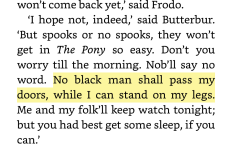The most distinguished of Tolkien's admirers and the most conspicuous of his defenders has been Mr. W. H. Auden. That Auden is a master of English verse and a well-equipped critic of verse, no one, as they say, will dispute. It is significant, then, that he comments on the badness of Tolkien's verse - there is a great deal of poetry in The Lord of the Rings. Mr. Auden is apparently quite insensitive - through lack of interest in the other department.- to the fact that Tolkien's prose is just as bad. Prose and verse are on the same level of professorial amateurishness. What I believe has misled Mr. Auden is his own special preoccupation with the legendary theme of the Quest. He has written a book about the literature of the Quest; he has experimented with the theme himself in a remarkable sequence of sonnets; and it is to be hoped that he will do something with it on an even larger scale. In the meantime - as sometimes happens with works that fall in with one's interests - he no doubt so overrates The Lord of the Rings because he reads into it something that he means to write himself. It is indeed the tale of a Quest, but, to the reviewer, an extremely unrewarding one. The hero has no serious temptations; is lured by no insidious enchantments, perplexed by few problems. What we get is a simple confrontation - in more or less the traditional terms of British melodrama - of the Forces of Evil with the Forces of Good, the remote and alien villain with the plucky little home-grown hero. There are streaks of imagination: the ancient tree-spirits, the Ents, with their deep eyes, twiggy beards, rumbly voices; the Elves, whose nobility and beauty is elusive and not quite human. But even these are rather clumsily handled. There is never much development in the episodes; you simply go on getting more of the same thing. Dr. Tolkien has little skill at narrative and no instinct for literary form. The characters talk a story-book language that might have come out of Howard Pyle, and as personalities they do not impose themselves. At the end of this long romance, I had still no conception of the wizard Gandalph, who is a cardinal figure, had never been able to visualize him at all. For the most part such characterizations as Dr. Tolkien is able to contrive are perfectly stereotyped: Frodo the good little Englishman, Samwise, his dog-like servant, who talks lower-class and respectful, and never deserts his master. These characters who are no characters are involved in interminable adventures the poverty of invention displayed in which is, it seems to me, almost pathetic. On the country in which the Hobbits, the Elves, the Ents and the other Good People live, the Forces of Evil are closing in, and they have to band together to save it. The hero is the Hobbit called Frodo who has become possessed of a ring that Sauron, the King of the Enemy, wants (that learned reptilian suggestion - doesn't it give you a goosefleshy feeling?). In spite of the author's disclaimer, the struggle for the ring does seem to have some larger significance. This ring, if one continues to carry it, confers upon one special powers, but it is felt to become heavier and heavier; it exerts on one a sinister influence that one has to brace oneself to resist. The problem is for Frodo to get rid of it before he can succumb to this influence.
NOW, this situation does create interest; it does seem to have possibilities. One looks forward to a queer dilemma, a new kind of hair-breadth escape, in which Frodo, in the Enemy's kingdom, will find himself half-seduced into taking over the enemy's point of view, so that the realm of shadows and horrors will come to seem to him, once he is in it, once he is strong in the power of the ring, a plausible and pleasant place, and he will narrowly escape the danger of becoming a monster himself. But these bugaboos are not magnetic; they are feeble and rather blank; one does not feel they have any real power. The Good People simply say « Boo » to them. There are Black Riders, of whom everyone is terrified but who never seem anything but specters. There are dreadful hovering birds-think of it, horrible birds of prey! There are ogreish disgusting Orcs, who, however, rarely get to the point of committing any overt acts. There is a giant female spider - a dreadfu1 creepy-crawly spider! - who lives in a dark cave and eats people. What one misses in all these terrors is any trace of concrete reality. The preternatural, to be effective, should be given some sort of solidity, a real presence, recognizable features - like Gulliver, like Gogol, like Poe; not like those phantom horrors of Algernon Blackwood which prove so disappointing after the travel-book substantiality of the landscapes in which he evokes them. Tolkien's horrors resemble these in their lack of real contact with their victims, who dispose of them as we do of the horrors in dreams by simply pushing them or puffing them away. As for Sauron, the ruler of Mordor (doesn't the very name have a shuddery sound.) who concentrates in his person everything that is threatening the Shire, the build-up for him goes on through three volumes. He makes his first, rather promising, appearance as a terrible fire-rimmed yellow eye seen in a water-mirror. But this is as far as we ever get. Once Sauron's realm is invaded, we think we are going to meet him; but he still remains nothing but a burning eye scrutinizing all that occurs from the window of a remote dark tower. This might, of course, be made effective; but actually it is not; we never feel Sauron's power. And the climax, to which we have been working up through exactly nine hundred and ninety-nine large close-printed pages, when it comes, proves extremely flat. The ring is at last got rid of by being dropped into a fiery crater, and the kingdom of Sauron « topples » in a brief and banal earthquake that sets fire to everything and burns it up, and so releases the author from the necessity of telling the reader what exactly was so terrible there. Frodo has come to the end of his Quest, but the reader has remained untouched by the wounds and fatigues of his journey. An impotence of imagination seems to me to sap the whole story. The wars are never dynamic; the ordeals give no sense of strain; the fair ladies would not stir a heartbeat; the horrors would not hurt a fly.
Now, how is it that these long-winded volumes of what looks to this reviewer like balderdash have elicited such tributes as those above? The answer is, I believe, that certain people - especially, perhaps, in Britain - have a lifelong appetite for juvenile trash. They would not accept adult trash, but, confronted with the pre-teen-age article, they revert to the mental phase which delighted in Elsie Dinsmore and Little Lord Fauntleroy and which seems to have made of Billy Bunter, in England, almost a national figure. You can see it in the tone they fall into when they talk about Tolkien in print: they bubble, they squeal, they coo; they go on about Malory and Spenser - both of whom have a charm and a distinction that Tolkien has never touched.
As for me, if we must read about imaginary kingdoms, give me James Branch Cabell's Poictesme. He at least writes for grown-up people, and he does not present the drama of life as a showdown between Good People and Goblins. He can cover more ground in an episode that lasts only three pages than Tolkien is able to in one of this twenty-page chapters, and he can create a more disquieting impression by a reference to something that is never described than Tolkien through his whole demonology.




